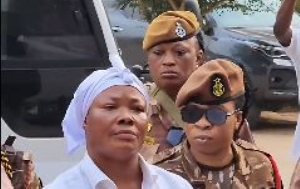THE FLIP SIDE OF MANASSEHS’
By Alhassan M. Murtala-Tamale
Every new process naturally goes through some teething challenges as it is being rolled out to achieve the goals and objectives for which it was established. The Savannah Accelerated Development Authority (SADA) is not an exception to this assertion.
Impeccable evidence points to the fact that, most projects hardly have any deliverables within the first two years of the appointment of the first Chief Executive Officer (CEO). SADA should be viewed against these precedents and not to be judged by expectations beyond its start-up phase (first-two years).
The Savannah Accelerated Development Authority (SADA) was established by an Act of parliament (ACT 805) of 2010 as a public policy response to the widening development gap between Northern Savannah Ecological Zone and the rest of Ghana, the first CEO was appointed in 2012 to implement it with a vision and mission of: “Creating a forested, green and peaceful society in a stable and dynamic economy, doubling per capital incomes and reducing the incidence of poverty in the Northern Savannah Ecological Belt to less than 20 percent of the population within 25 years”.
This was a vision couched out by our non-partisan parliament; the begging question then is where did the Authority governed by a 9-member Board of Directors and supervised by the Office of the President go wrong in deciding to plant trees? Mr. Manasseh Awuni conveniently kept this background information away from his viewers and readers.
SADA’s role is to facilitate, coordinate and catalyzes regional interventions where its statutory authority and political influence can facilitate and expedite the allocation of scarce resources to reducing the development gap between the North and the South. The tree planting was said to have started towards the latter part of June 2012. SADA’s critics alleged that some of the seedlings were planted in the dry season. Clearly, using sole sourcing could not prevent SADA from taking full advantage of the rainy season.
What would have happened if SADA had had to go through advertising and evaluation of bids before awarding the contract? Obviously, the tree planting could not have started in 2012. If SADA in its wisdom requested to PPA for exemption to sole source and PPA in its wisdom authorized SADA to sole source for the contractor, why should SADA be castigated so fiercely? Is sole sourcing illegal in Ghana? Did SADA receive approval before using it? These are the questions Mr. Manasseh ought to provided answers to rather than the blanket castigation of SADA. Another basic question that should be asked for which answers has since been provided are: Were some youth within the SADA catchment areas employed? Were the trees planted? Did the trees survive? The very recent University for Development Studies (UDS) draft final report has answered the above rhetorically questions and has since contradicted the widely unhelpful media reportage by some section of the media and has exonerated the board. The draft report has indicated that, an average of about 85% of the agency-sponsored trees planted within the Northern Savannah Zone did survive, contradicting Mr Manasseh’s report.
Ironically, the capacity of an individual to cover all the beneficiary areas is not been questioned but taken as the true representation of what is on site making nonsense of an institution of learning that has both the human capacity and brooder technical knowledge to undertake such a enormous task.
Its evidence, according to the four member expert team led by Prof. S.K Oppong which was tasked to evaluate the tree planting that, a total of 145 plantations were surveyed in all the four afforestation zones, encompassing 45 political districts in 5 regions, about eight trees species were planted in the various operational zones.
The UDS report which was prepared by the Faculty of Renewable Natural Resources has gone abet further to commend SADA, according to the report, “the dream of SADA to ameliorate environmental degradation and mitigate climate change as well as create jobs for the unemployed in its operational area will not be a mirage but a reality” captured in the report.
SADA has the mandate to engage directly with markets and strive to improve the efficient and effective working of markets as its distinctive approach to modernizing agriculture and generating new agri-business and non-farm business activity, in recognition that the market system is essential for stimulating and incentivizing farmers and entrepreneurs to use higher quality inputs and invest in improved technology to improve productivity, raise yields and generate higher levels of profit. The authority still has the potential to achieve its mandate despite the challenges; it is very intriguing to have learned that, the very person spearheading the media spank on SADA either deliberately did not visit his home town to see the good work that is been down by the same authority he has claim is not doing enough or it is just one of the popular adage that “give the dog a bad name and hang it” which interesting is an adage commonly used by the good people of the upper East Region of which Manasseh Awuni is a native.
If the SADA board of which the former CEO was part will not be commended for the job done so far, scandalous and sponsored media on slug should not be their remuneration, after all, there are other excellent ventures SADA has undertaken which is there for all to point out.
The mango program has been a success, the dry season farming program is on course, the butternut squash for export has also stated in earners. Many farmers and farm groups within the SADA catchment areas are beneficiaries of the SADA tractors, May youth, who otherwise may have been in the busy streets of Accra in search for non-existing jobs are fully engaged in the forestation project of SADA.
The successes of such a policy should be the collective responsibility of all Ghanaians especially folks within the SADA catchment area.
Opinions of Saturday, 10 May 2014
Columnist: Al-Hajj














